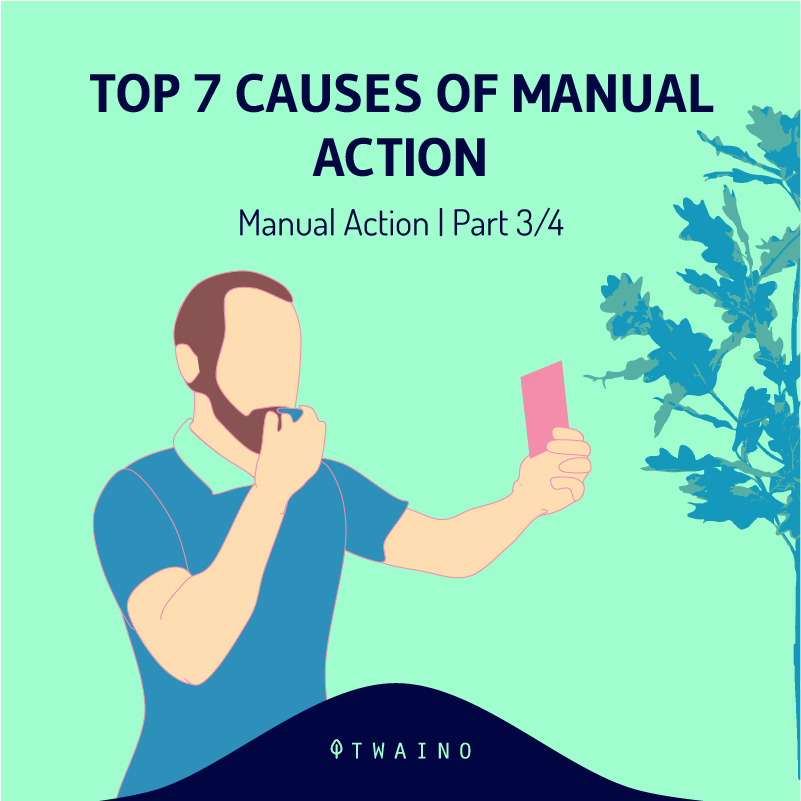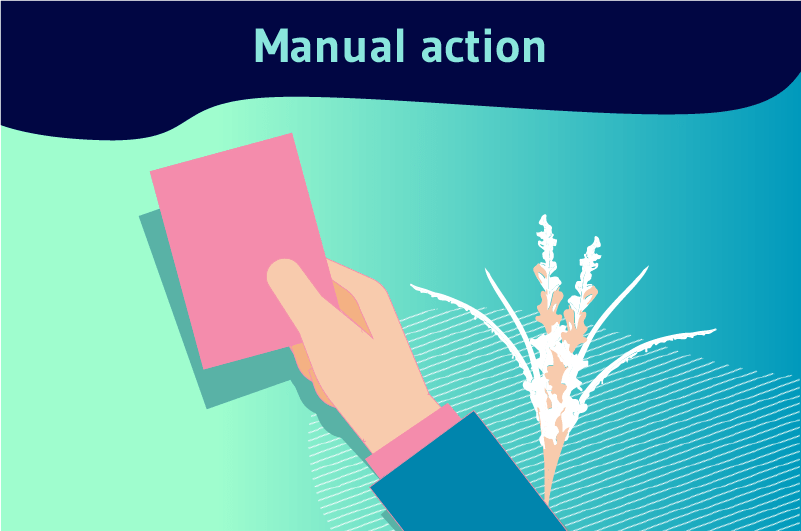Discover the hidden side of SEO with our breakdown of the mysterious term manual action – your website’s worst nightmare.

Image courtesy of via DALL-E 3
Table of Contents
Introduction to Manual Action
Have you ever heard of a “manual action” when it comes to websites and search engines? Let’s break it down into simple terms to understand what it means and why it’s essential to avoid it.
What is Manual Action?
In the world of websites and search engines, a manual action is like a penalty given by search engines, such as Google, when a website breaks the rules. Just like in sports, if you don’t follow the rules, you might get a penalty – the same goes for websites!
Why Do Manual Actions Happen?
Manual actions are taken against websites for various reasons. Common reasons include creating spammy content, having unnatural links on your site, or having very little content (which is called thin content). When websites engage in these activities, they can get flagged for a manual action.
Importance of Manual Actions
It’s crucial to avoid manual actions because they can have a big impact on websites. When a website receives a manual action, it can affect its visibility in search engine results, which means fewer people might find and visit the site. That’s why website owners need to be careful and follow the rules to keep their websites in good standing.
Types of Manual Actions
Spammy content is like junk food for websites – it might look appealing at first, but it’s bad for you in the long run. When websites stuff keywords unnaturally, create low-quality articles, or engage in other deceptive practices, search engines may put a manual action in place.
Unnatural Links
Imagine if you were in a race, and instead of running, you took a shortcut by hitching a ride in a car. Unnatural links are like those shortcuts. When websites try to manipulate their search engine rankings by buying links or engaging in link schemes, search engines can detect this behavior and apply a manual action.
Thin Content
Thin content is like trying to survive on a diet of just water – it might sustain you for a short while, but it’s not enough in the long term. When websites have shallow, insignificant, or duplicated content that doesn’t provide any real value to users, search engines may issue a manual action.
Detecting Manual Actions on Your Website
When it comes to managing a website, it’s crucial to be aware of any manual actions that might be affecting its performance. Detecting manual actions early can help you address issues promptly and avoid further penalties from search engines like Google. Let’s dive into how you can identify if your website has received a manual action.

Image courtesy of www.twaino.com via Google Images
Using Google Search Console
Google Search Console is a powerful tool that can provide valuable insights into your website’s performance. To check for manual actions, log in to your Search Console account and navigate to the Security & Manual Actions section. Here, you can view any manual actions that have been applied to your site and take necessary steps to resolve them.
Reading Notifications
Google will typically send notifications to your Search Console account if a manual action has been taken against your website. These notifications will outline the specific issues that led to the penalty, allowing you to understand what needs to be addressed. Make sure to read these notifications carefully and follow the instructions provided by Google.
Checking Search Traffic
Another way to detect a manual action is by monitoring changes in your website’s search traffic. If you notice a sudden drop in organic traffic, it could be a sign that your site has been penalized. Review your analytics data and look for any significant decreases in traffic from search engines. This can help you identify potential manual actions and take corrective measures.
Steps to Fix Manual Actions
When you receive a manual action from a search engine, the first step is to figure out what caused it. Look for any spammy content, unnatural links, or thin content on your website that may have triggered the penalty.
Remove or Fix the Issues
Once you have identified the problem, it’s essential to take action to remove or fix the issues causing the manual action. This may involve deleting spammy content, disavowing unnatural links, or adding valuable content to address thin content concerns.
Submit a Reconsideration Request
After addressing the issues on your website, you can submit a reconsideration request to the search engine that issued the manual action. In this request, explain the steps you have taken to fix the problems and request a review of your website.
Preventing Manual Actions
Search engines, like Google, have specific rules that websites must adhere to. It is crucial to follow these guidelines to avoid facing manual actions. By staying within the boundaries set by search engines, you can prevent penalties that may harm your website’s ranking.

Image courtesy of www.twaino.com via Google Images
Create High-Quality Content
One of the best ways to prevent manual actions is by focusing on creating high-quality content. Search engines value websites that offer valuable and relevant information to users. By producing content that is well-written, informative, and engaging, you can establish authority in your niche and avoid penalties.
Regular Audits
Regularly auditing your website can help identify potential issues that could lead to manual actions. By conducting audits, you can ensure that your website complies with search engine guidelines and address any issues before they escalate. This proactive approach can help safeguard your website from facing unnecessary penalties.
Real-Life Examples of Manual Actions
Some big brands have also faced manual actions from search engines due to violations of their guidelines. For instance, a popular clothing retailer was penalized for using unnatural links to manipulate search rankings. The brand saw a significant drop in organic traffic and sales as a result of this penalty.
Similarly, a well-known travel website was issued a manual action for thin content, which resulted in a decrease in visibility on search engine results pages. This impacted their overall online presence and brand reputation.
Lessons Learned
From these examples, we can learn that even established brands are not immune to manual actions if they engage in practices that violate search engine guidelines. It’s crucial for all websites, regardless of their size or reputation, to adhere to best practices to avoid penalties that can negatively impact their online performance.
The Role of SEO in Manual Actions
SEO, which stands for search engine optimization, plays a crucial role in avoiding manual actions on websites. By following good SEO practices, website owners can ensure they comply with search engine guidelines and avoid penalties. Good SEO practices include creating high-quality and relevant content that provides value to users. This content should be properly optimized with relevant keywords and meta tags to help search engines understand the website’s content.

Image courtesy of www.twaino.com via Google Images
Bad SEO Practices
On the flip side, engaging in bad SEO practices can lead to manual actions from search engines. These bad practices include using black hat techniques like keyword stuffing, buying links, or cloaking content. These tactics are aimed at manipulating search engine rankings and are against search engine guidelines. Engaging in such practices can result in manual actions that penalize the website by lowering its search rankings or even removing it from search results altogether.
Frequently Asked Questions (FAQs)
When you discover a manual action on your website, the quickest way to resolve it is by identifying the problem that caused the penalty. Once you understand the issue, you can promptly remove or fix the problematic content or links that led to the manual action. After making the necessary changes, you can submit a reconsideration request to Google, asking them to review your website again. This process can help speed up the resolution of the manual action.
Can my site recover from a manual action?
Yes, your website can recover from a manual action. By identifying and fixing the issues that led to the penalty, submitting a reconsideration request, and ensuring compliance with search engine guidelines going forward, your site has a good chance of recovering. It’s essential to address the root cause of the manual action and take steps to prevent similar issues in the future to increase the likelihood of recovery.
Do manual actions affect all search engines?
Manual actions primarily refer to penalties enforced by search engines like Google. While other search engines like Bing may have their own set of guidelines and penalties, the term “manual action” specifically relates to actions taken by Google in response to violations of their rules. It’s crucial to adhere to the guidelines of each search engine to avoid penalties and maintain a positive online presence.
Conclusion
In conclusion, we have explored what manual action is, why it occurs, and the implications it can have on a website’s search engine rankings. Understanding and avoiding manual actions is crucial for maintaining a healthy online presence and ensuring that your website is in compliance with search engine guidelines.
We learned that manual actions are penalties imposed by search engines when websites violate rules, such as creating spammy content, having unnatural links, or having thin content. These penalties can significantly impact a website’s visibility and traffic, making it essential to address and rectify any issues promptly.
By following good SEO practices, creating high-quality content, and conducting regular audits, website owners can prevent manual actions from happening. It’s also important to be aware of how to detect manual actions using tools like Google Search Console and to know the steps for fixing them, including submitting a reconsideration request.
Through real-life examples of big brands facing manual actions, we can see the importance of compliance with search engine guidelines and the lessons learned from these experiences. Additionally, we explored the role of SEO in manual actions, highlighting both good and bad SEO practices that can influence search engine penalties.
Ultimately, maintaining a clean website that adheres to search engine guidelines is essential for long-term success online. By understanding manual actions, taking proactive steps to prevent them, and addressing any issues promptly, website owners can safeguard their online presence and continue to thrive in the digital landscape.







